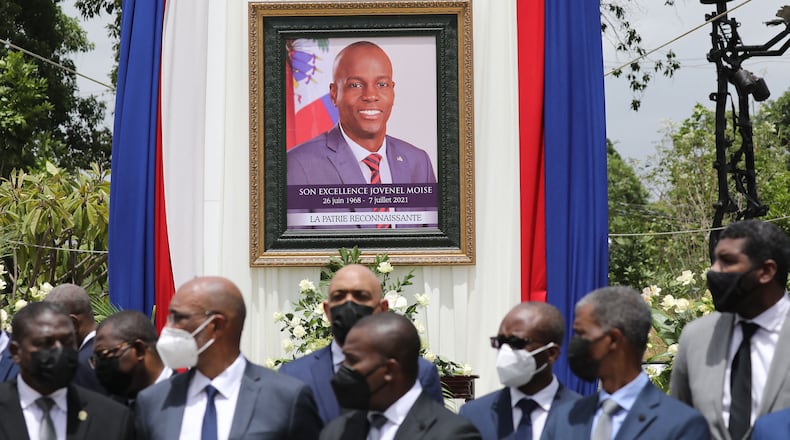Frantz Bourget’s mother arrived in the United States in March to visit family and see her doctors, with plans to return to Haiti at the beginning of June.
Her return home, though, was postponed twice — once because of safety concerns after fighting broke out between rival gangs in her Port-au-Prince neighborhood and later after learning of the brazen early morning assassination of 53-year-old President Jovenel Moïse in his Port-au-Prince home on July 7.
At least two Haitian Americans and several Colombians have been implicated in his slaying, according to CNN and other news sources.
“She just got stuck this time,” said Bourget, an Atlanta businessman and treasurer for the United Front of the Haitian Diaspora, a nonprofit that does advocacy work for the Haitian diaspora. “It’s not going to get better any time soon. A lot of folks are out for revenge.”
In an interview, Bourget, who came to the United States in 1970 when he was 13, said Haitians in the diaspora have long rode wave after wave of crises, including political upheavals, a devastating earthquake, floods, poor health care, disease, gender violence and extreme wealth inequities.
It’s the poorest nation in the Latin America and Caribbean region, according to the World Bank.
“This is Haiti. Every so often, something blows up,” he said matter-of-factly.
Moïse’s slaying, though, reverberated throughout the Haitian diaspora, including here in Georgia.
“The president got assassinated,” he said. “That’s not something you hear often.”
He’s been in contact with extended family and friends in the Caribbean nation, located roughly 600 miles from Florida, and doesn’t want his mother to go home anytime soon.
“Everyone is on pins and needles,” he said. “They don’t know what’s coming next. The reaction that was expected — that people would get in the streets and riot — has not happened.”
At least not on the level people expected.
Credit: CONTRIBUTED
Credit: CONTRIBUTED
“Jovenel was not a popular person and this is the president,” said Francois Pierre-Louis, a political science professor at Queens College who was born in Haiti. “The man had so many enemies, anyone could have done it.”
Georgia-based nonprofits and church groups have long had a presence in Haiti.
CARE, for instance, has worked in Haiti for at least six decades.
Following the 2010 earthquake, the Atlanta-based nonprofit extended its support to people in Léogâne and Port-au-Prince, providing access to safe water and sanitation, housing and knowledge in building sturdier structures.
Since the cholera outbreak in October 2010, CARE has been particularly active in rural areas of the country to spread prevention messages, improve safe water supplies and support medical facilities with essential materials.
Moïse, a businessman, assumed office in 2017. His critics grew in number over the years as he refused to hold parliamentary elections and ruled by decree. There were charges of corruption, and critics said he was eroding democracy and he extended his rule.
As gang activity and kidnappings increased, many called for the president’s resignation.
Reginald Grand’Pierre, a businessman from South Fulton, still has a brother and extended family in Haiti.
“There’s a sense of anticipation,” said Grand’Pierre, who left Haiti at 18 in 1980 to study abroad. “We don’t know how things are going to unfurl. Right now, there’s isolated violence and the population hasn’t come out into the streets and expressed themselves. There’s a sense of calm right now. Maybe it’s the quiet before the storm. Everybody is kind of anxious.”
Grand’Pierre noted Haiti has been weakened after decades of problems. He wasn’t a supporter of Moïse, but still his killing was “like a blow to your stomach. His election was contested and because of certain decisions he made, he lost support” yet “I don’t think anyone wanted his assassination because it weakens everybody. It seems like every 10 years, we get hit by a calamity. ”
Grand’Pierre and other Haitian Americans share a big concern.
They worry that local institutions and residents will feel less empowered to resolve this latest crisis on their own.
Saurel Quettan, president of the Georgia Haitian-American Chamber of Commerce, got an early morning message on a WhatsApp group of other Haitians in the diaspora about the assassination. He looked at international news sources to confirm.
“I found myself saddened because we are a smart people,” said Quettan, who was born in Port-au-Prince. “We’re smart and cunning yet we can’t seem to manage a country of 12 million people. I’m also sad for the ongoing suffering that the people of Haiti have endured, sad for the president and his family and the people in his administration who are dealing with the aftermath of his assassination.”
For Quettan, an entrepreneur in Snellville, his concern for the country remains the same: that Haiti’s people have food, shelter, security and resources to help themselves. “This is a distraction that will take the attention of the Haitian people away from developing their country. We are sick and tired of the manufactured destabilization that has plagued Haiti for years and years.”
Pierre-Louis doesn’t want to see the United States or the European Union send troops to Haiti, although they could have a role facilitating dialogue between the various factions.
“Let everybody in and begin to have a national conversation, but don’t already choose who should be president and prime minister,” he said. “Let the people decide. We need the support of the international community but not as an enforcer of the status quo.”
About the Author
Keep Reading
The Latest
Featured



